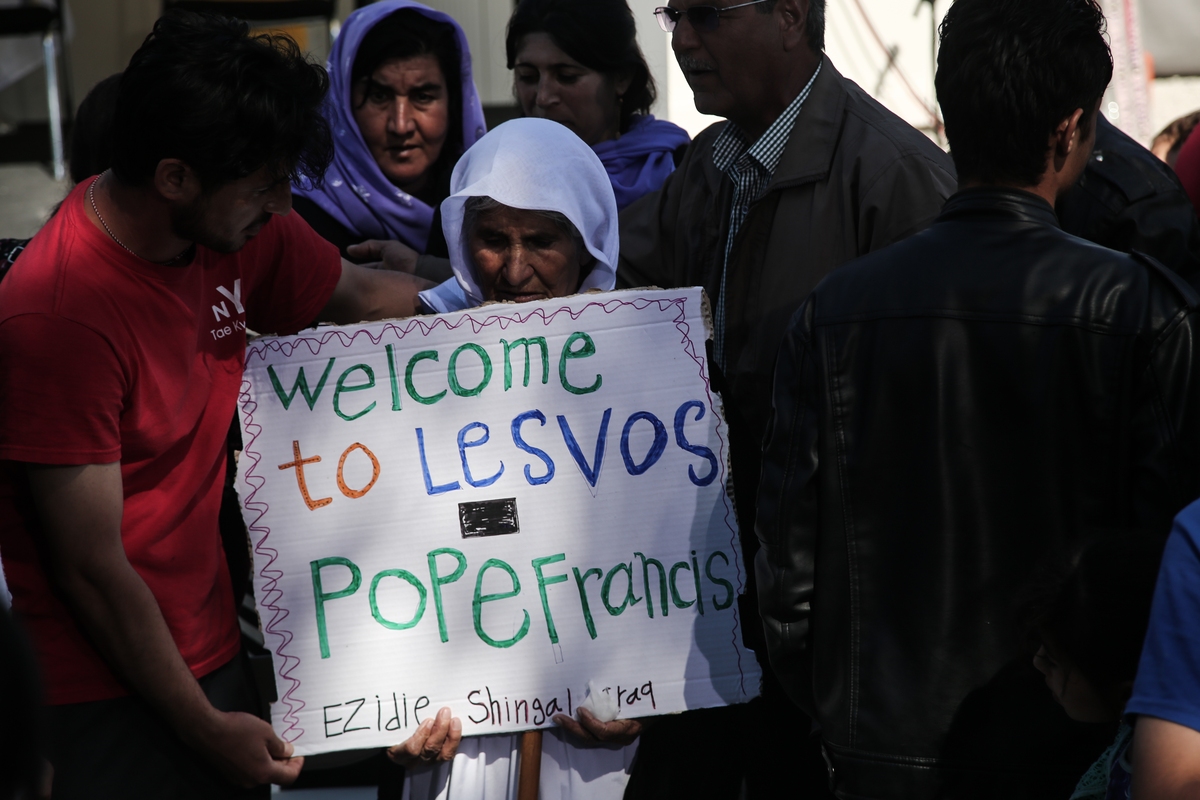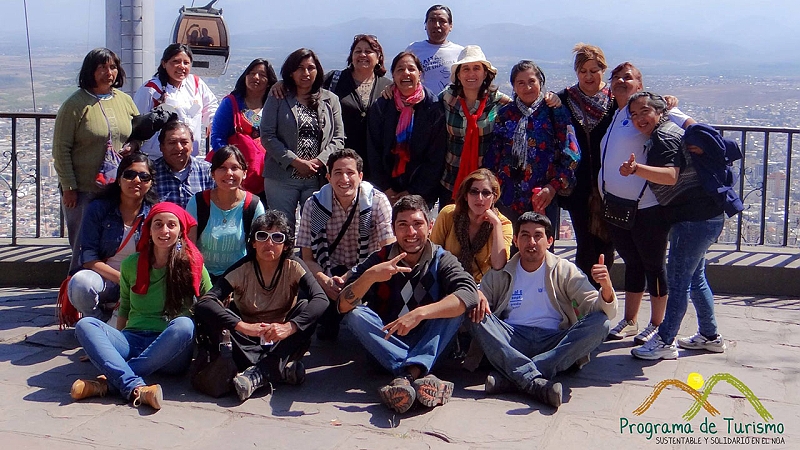
Argentina. Sustainable tourism in rural indigenous communities
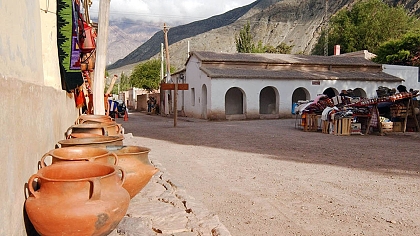 Salta: one of the more beautiful provinces of Argentina, with natural riches and ancient cultures that resisted the Spanish Conquest over 500 years ago. With the arrival of the new millennium it has been upgraded as a destination for tourists and the undisputed centre of the Northwest Region of Argentina. “The Sustainable Tourism Programme was begun in 2010 upon encouragement from the Bishops Commission for Migration and Tourism,” Paula González explains. “The Northwest of Argentina is mainly inhabited by descendants of indigenous peoples. Some live in communities and others are farmers. It demonstrates their connection to the land, both for produce and for artisanal crafts.” The important migrant waves, from Europe, the Middle East and Latin America – especially Bolivia – have created a ‘coexistence of cultures’, with a strong indigenous component that makes this a very unique region with cultural challenges.” The programme was begun in response to the lack of jobs. Only 39% of the economically active population had jobs. “We proposed working in the rural and more remote areas that were most affected,” explains the coordinator. The geography of the region contains wide valleys and rocky highlands (up to above 3000 metres). “We realized that the problem was due mainly to isolation,” continues Paula González, “which prevents them from selling their products, and in some communities there was a lack of water and energy. Those most affected were women and young people.” At that time Argentina was setting up a national tourism development plan that excluded rural communities. Then, the Catholic Church pointed to the need for more equitable and inclusive proposals. The goal was to create new tourist destinations based on agricultural and handicraft production, which are the basis of their livelihood.
Salta: one of the more beautiful provinces of Argentina, with natural riches and ancient cultures that resisted the Spanish Conquest over 500 years ago. With the arrival of the new millennium it has been upgraded as a destination for tourists and the undisputed centre of the Northwest Region of Argentina. “The Sustainable Tourism Programme was begun in 2010 upon encouragement from the Bishops Commission for Migration and Tourism,” Paula González explains. “The Northwest of Argentina is mainly inhabited by descendants of indigenous peoples. Some live in communities and others are farmers. It demonstrates their connection to the land, both for produce and for artisanal crafts.” The important migrant waves, from Europe, the Middle East and Latin America – especially Bolivia – have created a ‘coexistence of cultures’, with a strong indigenous component that makes this a very unique region with cultural challenges.” The programme was begun in response to the lack of jobs. Only 39% of the economically active population had jobs. “We proposed working in the rural and more remote areas that were most affected,” explains the coordinator. The geography of the region contains wide valleys and rocky highlands (up to above 3000 metres). “We realized that the problem was due mainly to isolation,” continues Paula González, “which prevents them from selling their products, and in some communities there was a lack of water and energy. Those most affected were women and young people.” At that time Argentina was setting up a national tourism development plan that excluded rural communities. Then, the Catholic Church pointed to the need for more equitable and inclusive proposals. The goal was to create new tourist destinations based on agricultural and handicraft production, which are the basis of their livelihood.  “The first year, we identified 30 communities and 7 key areas for development in 5 Provinces. Currently, almost 6 years later we are working in 5 areas. There are around fifty entrepreneurs linked to the ‘Network of Tourism Entrepreneurs (NOA)’. If we were to highlight anything it would be the network of organisations that have joined forces to work together in a structured way – national, provincial and local. They include universities, NGOs and businesses. They have also been closely connected to the Economy of Communion and the Movement for Unity in Politics that are key allies. Over these years,” Paula concludes, “what gave strength and effectiveness to the development of the project was the work done on the links in the chain of values and relationships that were formed between all the people involved.” We have already come a long way. There are local projects, new leaders capable of carrying things forward, and we can already foresee very satisfactory results: for example, interaction and mutual cooperation amongst different communities that are stepping out of their anonymity and becoming generators of their own history. For more information: Website Video
“The first year, we identified 30 communities and 7 key areas for development in 5 Provinces. Currently, almost 6 years later we are working in 5 areas. There are around fifty entrepreneurs linked to the ‘Network of Tourism Entrepreneurs (NOA)’. If we were to highlight anything it would be the network of organisations that have joined forces to work together in a structured way – national, provincial and local. They include universities, NGOs and businesses. They have also been closely connected to the Economy of Communion and the Movement for Unity in Politics that are key allies. Over these years,” Paula concludes, “what gave strength and effectiveness to the development of the project was the work done on the links in the chain of values and relationships that were formed between all the people involved.” We have already come a long way. There are local projects, new leaders capable of carrying things forward, and we can already foresee very satisfactory results: for example, interaction and mutual cooperation amongst different communities that are stepping out of their anonymity and becoming generators of their own history. For more information: Website Video
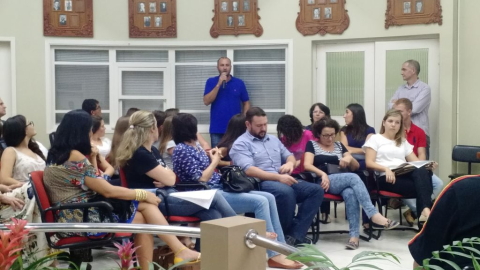
In Brazil the Focolare’s stance for fraternity
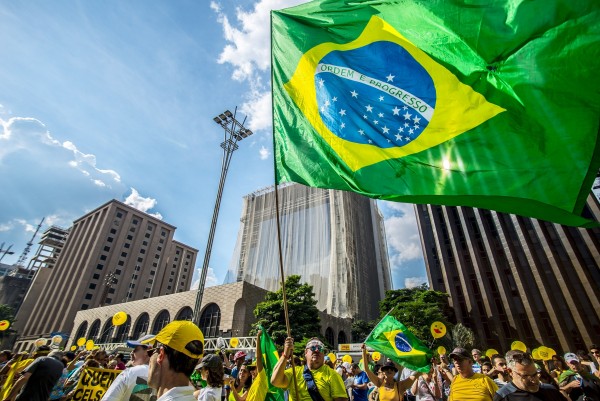 With 367 ayes and 137 nays, the Brazilian deputies approved the opening of the impeachment procedure against President Dilma Rousseff, while other 200 million greatly divided Brazilians, anxiously awaited the outcome of the voting session. It is now the Senate’s turn to confirm or not the implementation the indictment of the President. Should it be favourable, the vote of 11 May will suspend the President from her mandate for 6 months, while awaiting for the final verdict. The Brazilian constitution provides, in this case and for this length of time, that the Vice-President will assume the office. The Brazilian bishops in an official declaration dated 13 April, aired their opinions “in the face of the profound ethical, political, economic and institutional crisis” which is besetting the country with “unprecedented scandals of corruption,” involving businessmen, politicians, public officers in scheme which, besides being immoral and criminal, will be paid dearly”– the bishops said – especially by the poor. On focusing attention on the impeachment, they affirmed that they were “closely following this procedure” in the hope that everything would be done “in compliance with judicial system of the democratic rule of law. They furthermore underlined that “the good of the Nation demands that all parties overcome their personal interest, that of parties and groups” so that “the polarisation of ideological positions in a highly emotive atmosphere, would lead to the loss of the objectives and bring division and violence that menace social peace.” They asked the “Brazilian people to preserve the values of democratic co-existence, respect of one another, tolerance and healthy pluralism, and promote a peaceful political debate.” They concluded by affirming their belief “in dialogue, in the wisdom of the Brazilian people and the discernment of the authorities in seeking the strategies that can guarantee the solution to the actual crisis and the preservation of peace in our country.”
With 367 ayes and 137 nays, the Brazilian deputies approved the opening of the impeachment procedure against President Dilma Rousseff, while other 200 million greatly divided Brazilians, anxiously awaited the outcome of the voting session. It is now the Senate’s turn to confirm or not the implementation the indictment of the President. Should it be favourable, the vote of 11 May will suspend the President from her mandate for 6 months, while awaiting for the final verdict. The Brazilian constitution provides, in this case and for this length of time, that the Vice-President will assume the office. The Brazilian bishops in an official declaration dated 13 April, aired their opinions “in the face of the profound ethical, political, economic and institutional crisis” which is besetting the country with “unprecedented scandals of corruption,” involving businessmen, politicians, public officers in scheme which, besides being immoral and criminal, will be paid dearly”– the bishops said – especially by the poor. On focusing attention on the impeachment, they affirmed that they were “closely following this procedure” in the hope that everything would be done “in compliance with judicial system of the democratic rule of law. They furthermore underlined that “the good of the Nation demands that all parties overcome their personal interest, that of parties and groups” so that “the polarisation of ideological positions in a highly emotive atmosphere, would lead to the loss of the objectives and bring division and violence that menace social peace.” They asked the “Brazilian people to preserve the values of democratic co-existence, respect of one another, tolerance and healthy pluralism, and promote a peaceful political debate.” They concluded by affirming their belief “in dialogue, in the wisdom of the Brazilian people and the discernment of the authorities in seeking the strategies that can guarantee the solution to the actual crisis and the preservation of peace in our country.”  The Political Movement for the unity of Brazil (MPPU) – association for political confrontation which draws inspiration from the ideals of fraternity typical of the spirituality of the Focolare – affirmed through its President, Sergio Previdi “its conviction in the force of dialogue that is free from prejudices.” Previdi moreover invited the citizens to “call up inclusive dialogue” because “in exercising democracy together we can put into practice the necessary actions for the good of all.” “A lot can still be done – they said – if we put into practice the culture of fraternity, overcoming party politics positively in the daily political life of the country.” For the MMPU of Brazil the main concern in this delicate moment is that of not “scattering our forces and allowing ideological and party differences to divide us,” but of “acknowledging our differences so as to deepen dialogue.” And above all “making the effort to gather information from various sources, in order to get closer to the truth.” The numerous members of the Focolare Movement in Brazil, in line with the Brazilian Episcopal Conference, undertakes to offer what they consider “the main contribution we can give in this difficult moment: the declaration and testimony of fraternity lived – the core of the spirituality of unity that inspires us all. ”
The Political Movement for the unity of Brazil (MPPU) – association for political confrontation which draws inspiration from the ideals of fraternity typical of the spirituality of the Focolare – affirmed through its President, Sergio Previdi “its conviction in the force of dialogue that is free from prejudices.” Previdi moreover invited the citizens to “call up inclusive dialogue” because “in exercising democracy together we can put into practice the necessary actions for the good of all.” “A lot can still be done – they said – if we put into practice the culture of fraternity, overcoming party politics positively in the daily political life of the country.” For the MMPU of Brazil the main concern in this delicate moment is that of not “scattering our forces and allowing ideological and party differences to divide us,” but of “acknowledging our differences so as to deepen dialogue.” And above all “making the effort to gather information from various sources, in order to get closer to the truth.” The numerous members of the Focolare Movement in Brazil, in line with the Brazilian Episcopal Conference, undertakes to offer what they consider “the main contribution we can give in this difficult moment: the declaration and testimony of fraternity lived – the core of the spirituality of unity that inspires us all. ”
Giving wings to hope in Moscow
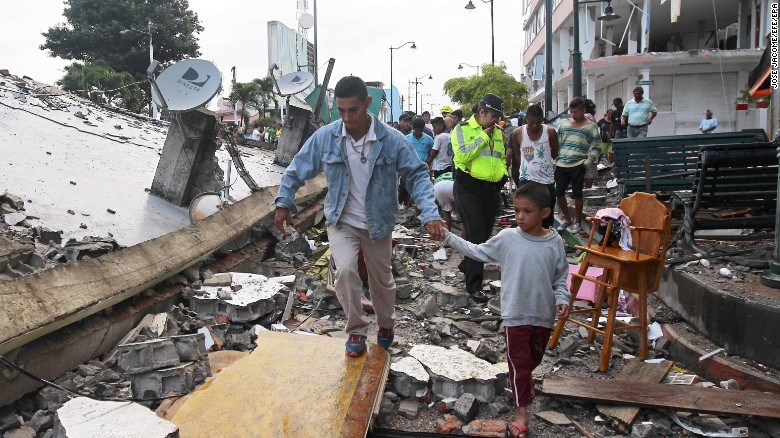
Ecuador Emergency
 “Our country’s coastal region was hit by a severe earthquake with a magnitude of 7.8 on the Richter scale. It was felt throughout Ecuador, and also in several regions of Colombia and northern Peru,” write Fabian and Ardita from the Focolare community in Quito. “The situation is critical especially in several devastated cities.” “The solidarity of the people was prompt and concrete: people risking their own lives to help others; testimonies of the many people who lost loved ones; but in the midst of all the suffering there is also the strong-felt faith of the people. It’s quite moving and inspires us to believe in His love.” In response to the emergency in Ecuador the Focolare Movement has launched a fundraiser while a study is underway to see what can be done locally on the ground. News has also arrived from Focolare communities in Nagasaki and Tokyo (Japan): “For two days the country has been immersed in an atmosphere of ‘suspense’ because of the earthquake on Kyushu Island, in the regions of Kumamoto and Oita. The situation has activated an immediate solidarity effort and prayer in both religious and civil sectors.” Local authorities have already made arrangements to welcome the nearly 184,000 displaced persons. How you can help: Donations sent to the accounts below will be managed jointly by the Associations Action for a United World (AMU) and Action for New Families (AFN). In many countries of the European Union and in other countries of the world tax benefits are available for making such donations according to local regulations. How you can help: CAUSE: Ecuador Earthquake Emergency
“Our country’s coastal region was hit by a severe earthquake with a magnitude of 7.8 on the Richter scale. It was felt throughout Ecuador, and also in several regions of Colombia and northern Peru,” write Fabian and Ardita from the Focolare community in Quito. “The situation is critical especially in several devastated cities.” “The solidarity of the people was prompt and concrete: people risking their own lives to help others; testimonies of the many people who lost loved ones; but in the midst of all the suffering there is also the strong-felt faith of the people. It’s quite moving and inspires us to believe in His love.” In response to the emergency in Ecuador the Focolare Movement has launched a fundraiser while a study is underway to see what can be done locally on the ground. News has also arrived from Focolare communities in Nagasaki and Tokyo (Japan): “For two days the country has been immersed in an atmosphere of ‘suspense’ because of the earthquake on Kyushu Island, in the regions of Kumamoto and Oita. The situation has activated an immediate solidarity effort and prayer in both religious and civil sectors.” Local authorities have already made arrangements to welcome the nearly 184,000 displaced persons. How you can help: Donations sent to the accounts below will be managed jointly by the Associations Action for a United World (AMU) and Action for New Families (AFN). In many countries of the European Union and in other countries of the world tax benefits are available for making such donations according to local regulations. How you can help: CAUSE: Ecuador Earthquake Emergency
| Azione per un Mondo Unito ONLUS (AMU) | Azione per Famiglie Nuove ONLUS (AFN) |
| IBAN: IT16 G050 1803 2000 0000 0120 434 at Banca Popolare Etica | IBAN: IT55 K033 5901 6001 0000 0001 060 at Banca Prossima |
| SWIFT CODE/BIC: CCRTIT2184D | SWIFT CODE/BIC: BCITITMX |
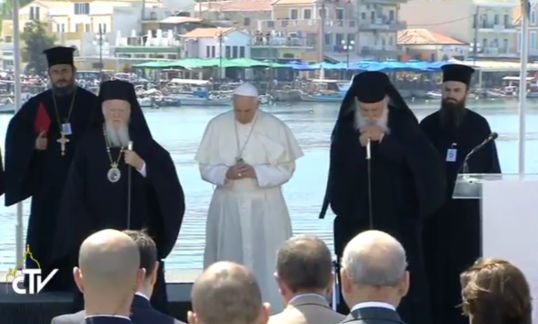
Francis, Bartholomew and Ieronymo embrace the immigrants
Pope Francis called it living Ecumenism and sharing one another’s pain, as he spoke to journalists on the outward flight from Rome. He called the refugee crisis the worst humanitarian disaster since the Second World War. The April 16th visit to the island of Lesbos was marked by sadness. After the EU-Turkey Agreement the Moria refugee camp seems more like a prison camp surrounded by protestors and indignation from humanitarian organisations. In the arms of Francis, Bartholomew and Ieronymo, the outcasts of history, the throw-outs of political decision-makers, the refugees have become the centre of the world. “Anybody who is afraid of you has never looked into your eyes,” Bartholomew stated with emphasis. “Don’t give up hope!” was the message that the Pope wished to leave the refugees, “The most beautiful gift we can give to one another is love: a merciful gaze, an eagerness to listen to and understand one another, a word of encouragement, a prayer…”.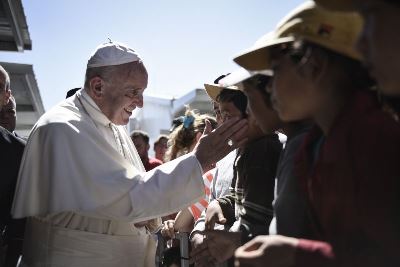 There was nothing but gratitude for the Greek people, expressed in different ways by the three religious leaders: In a moment of great difficulty caused by the serious economic crisis, the people still find the way and the heart to embrace those who flee to a better future. They expressed equal gratitude towards the many volunteers who showed up from all parts of Europe and around the world. Originally from South Africa, Pauline, from the Focolare Movement, has been living for many years between Athens and Lesbo. She repeatedly witnessed the landings of the refugees and helped to rescue them: “The Pope has also sent a political message at the border openings. I wonder why he didn’t go to Idomeni. Perhaps it would have been too political.” Chiara, from Pope John XXIII Association: “He said what I’ve felt for some time: Just stop classifying these people as ‘refugees’, as numbers. It’s time for personal contact, for knowing their stories, their backgrounds;” Eugenio, from the Italian Ambulance Corps at the Order of Malta, said: “I was very moved when he spoke of the children that die on the sea, because I have seen such scenes myself. I managed to shake hands with him and was strengthened for my work.” Cristina is Catholic and her grandparents are refugees that fled from Turkey to Lesvos: “It was an historic event, unimagineable on this island. It seems like a dream”. Father Maurice is coordinator of the Jesuit Refugee Service (JRS) in Greece. He remarked: “All of it was important: the words, the gestures, the silences. All of it spoke. The most powerful moment in the ‘jail’ was the personal contact the Pope had with each person” “A common message was sent to the refugees,” the Jesuit went on to say. They are mainly Muslims discovering a land of Christian origins. Therefore it matters that they see the unity of the Christian leaders and the closeness that these leaders wish to give a witness of.” “Moving. And very important from the ecumenical and political point of view, because of the meeting with Prime Minister, Alexis Tsipras,” said Vasileios Meichanetsidis from Apostles (an NGO from the Greek Orthodox Church). “The Pope recognised how much the Greeks had done, and the Greeks gladly welcomed him.”
There was nothing but gratitude for the Greek people, expressed in different ways by the three religious leaders: In a moment of great difficulty caused by the serious economic crisis, the people still find the way and the heart to embrace those who flee to a better future. They expressed equal gratitude towards the many volunteers who showed up from all parts of Europe and around the world. Originally from South Africa, Pauline, from the Focolare Movement, has been living for many years between Athens and Lesbo. She repeatedly witnessed the landings of the refugees and helped to rescue them: “The Pope has also sent a political message at the border openings. I wonder why he didn’t go to Idomeni. Perhaps it would have been too political.” Chiara, from Pope John XXIII Association: “He said what I’ve felt for some time: Just stop classifying these people as ‘refugees’, as numbers. It’s time for personal contact, for knowing their stories, their backgrounds;” Eugenio, from the Italian Ambulance Corps at the Order of Malta, said: “I was very moved when he spoke of the children that die on the sea, because I have seen such scenes myself. I managed to shake hands with him and was strengthened for my work.” Cristina is Catholic and her grandparents are refugees that fled from Turkey to Lesvos: “It was an historic event, unimagineable on this island. It seems like a dream”. Father Maurice is coordinator of the Jesuit Refugee Service (JRS) in Greece. He remarked: “All of it was important: the words, the gestures, the silences. All of it spoke. The most powerful moment in the ‘jail’ was the personal contact the Pope had with each person” “A common message was sent to the refugees,” the Jesuit went on to say. They are mainly Muslims discovering a land of Christian origins. Therefore it matters that they see the unity of the Christian leaders and the closeness that these leaders wish to give a witness of.” “Moving. And very important from the ecumenical and political point of view, because of the meeting with Prime Minister, Alexis Tsipras,” said Vasileios Meichanetsidis from Apostles (an NGO from the Greek Orthodox Church). “The Pope recognised how much the Greeks had done, and the Greeks gladly welcomed him.”  “We’re all migrants,” the Pope went on to say during the prayer at the port of Lesbo where, as at Lampedusa in 2013, he left a wreath of flowers on the surface of the sea. What is being expected of the political world? “It would be a matter of further stronger appeals especially toward Europe to consider the matter of the migrants and of the refugees not only in terms of internal politics or emergency, but as a new front on which the future of the continent comes into play along with its credibility in terms of its claims of principles and concrete politics,” said pasquale Ferrara, author of the recent book, Il mondo di Francesco. Bergoglio e la politica internazionale. Ferrara is a member of the Abba School for the field of political science and was the Italian Consul to Athens. “The Pope didn’t go there on a humanitarian mission, but wished to underscore this profound dimension,” Ferrara continued. “And the fact that he did it in an ecumenical manner was an even more powerful sign; almost like saying the politics isn’t managing to solve this issue, so we join the game, not as substitutes, but to underscore that this must be a point of priority on the world’s political agenda. The fact that the refugees brought to the Vatican were all Muslims underscores that ISIS is not only exterminating Christians. It is not a problem of religion, but of ending a war, all wars.” Joint Statement Maria Chiara De Lorenzo
“We’re all migrants,” the Pope went on to say during the prayer at the port of Lesbo where, as at Lampedusa in 2013, he left a wreath of flowers on the surface of the sea. What is being expected of the political world? “It would be a matter of further stronger appeals especially toward Europe to consider the matter of the migrants and of the refugees not only in terms of internal politics or emergency, but as a new front on which the future of the continent comes into play along with its credibility in terms of its claims of principles and concrete politics,” said pasquale Ferrara, author of the recent book, Il mondo di Francesco. Bergoglio e la politica internazionale. Ferrara is a member of the Abba School for the field of political science and was the Italian Consul to Athens. “The Pope didn’t go there on a humanitarian mission, but wished to underscore this profound dimension,” Ferrara continued. “And the fact that he did it in an ecumenical manner was an even more powerful sign; almost like saying the politics isn’t managing to solve this issue, so we join the game, not as substitutes, but to underscore that this must be a point of priority on the world’s political agenda. The fact that the refugees brought to the Vatican were all Muslims underscores that ISIS is not only exterminating Christians. It is not a problem of religion, but of ending a war, all wars.” Joint Statement Maria Chiara De Lorenzo

